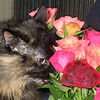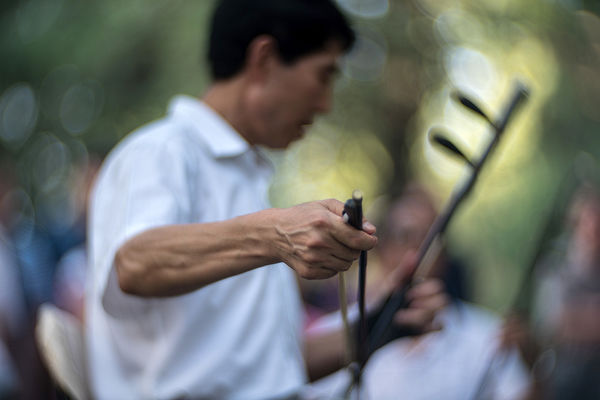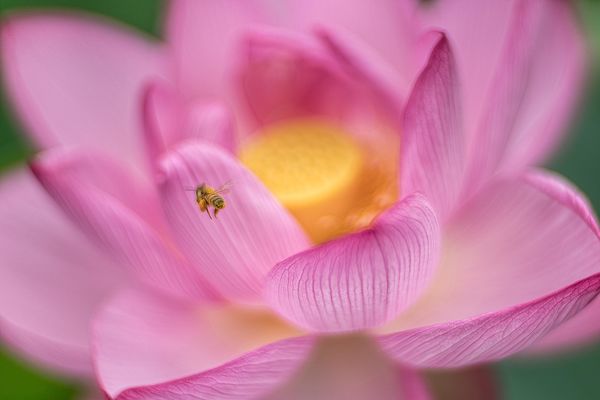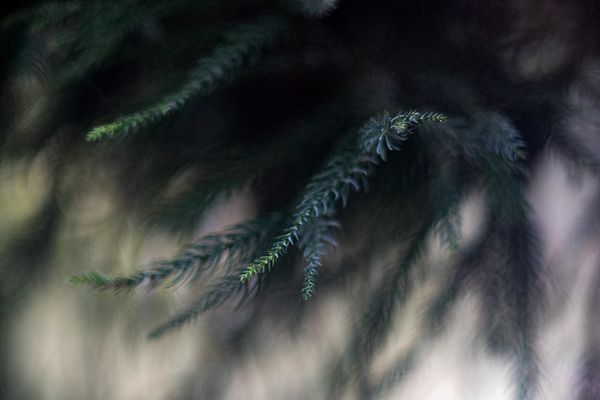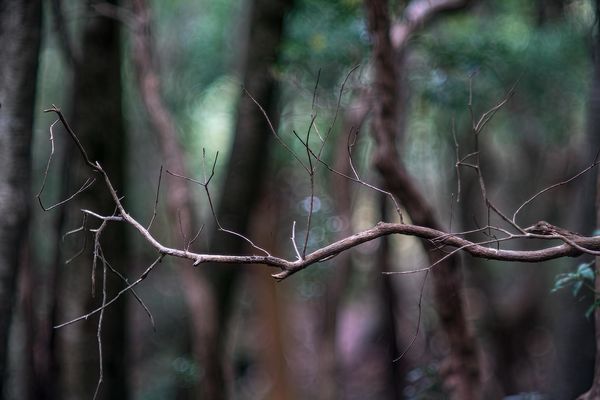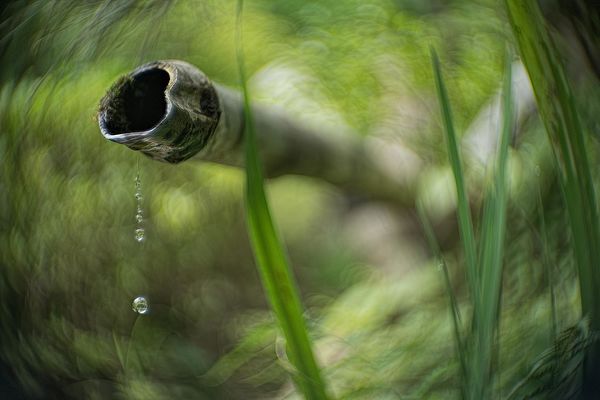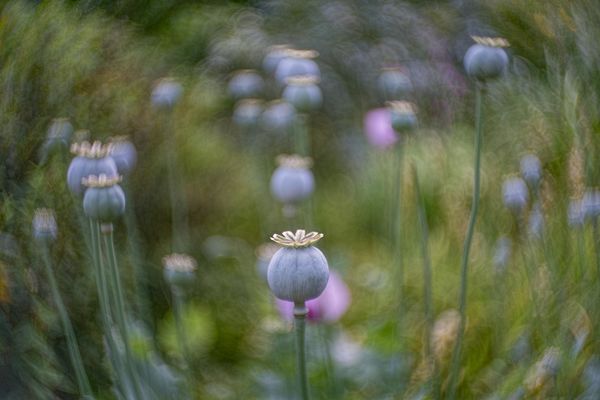Bouquet? Bokeh? Bokah? Smokah!
Jan 12, 2018 20:43:16 #
graybeard wrote:
Bro, the only difference between then and now is this: what they used to call background is now called "Bookay". They can't even agree on the spelling.
In addition to what others have pointed out, there are other corrections to the above.
Bokeh is the only correct spelling and it can be found in the out of focus foreground as well as the background. It is the aesthetic quality and not the quantity of the blur. It happens that points of light are easy to see and characterize, but darker areas also have bokeh.
A given lens can be described as producing harsh or smooth bokeh, but that does not necessarily make it good or bad in a given image. Depending on the particular image a harsh bokeh can look very nice!
Jan 12, 2018 21:37:13 #
Words are important! Especially when we need to teach, learn, help each other , and exchange ideas, techniques and artistic and aesthetic concepts in photography. Technical words, terms, nomenclature are all vital parts of communication about our craft. Sometimes, however, visual artistic concepts are difficult to define, explain, describe or express in strictly scientific, mathematical, or literal terms. Heaven knows, there are probably millions of theses terms used in the art communities, in technical circles and of course in the field of photography with its infinite and never ending supply of technical terms, buzz words, really cool technobabble, acronyms and abbreviation- seems there are new ones emerging and new phrases coined just about every day. The lexicon and glossary seem to grow exponentially as time goes on.
It's good to have all of this in our literature, otherwise how would we teach, learn or talk to each other about all their is to discuss. In some circles it is though that “art” has no rules, formulas or definite instructions. That's very philosophical but we still need to talk to each other, especially in the online cyber age. Just think of all the different aspects of light and lighting, composition, color and tonality management, let alone all the science of optics, electronics and the mechanics of our equipment. It might seem crass to reduce an artistic craft to mathematics, or rules but we gotta converse and start somewhere unless we want to live in a vacuum and only do our own things without involving anyone else.
If photographic images have psychological components, how do we describe moods, feelings, romance, conflict, tensions, human and geometric relationships. So we use our words- the traditional ones at our disposal and perhaps the ones we need to make up. “Bokeh” is one of those words! I always though that the Japaneses have a particularity adept propensity to create one or two word terms to describe stuff that English speakers would perhaps prefer to complicate in definition. They have some really nifty sounding words for stuff like committing suicide, falling out of favor by doing disgraceful or unethical things and a long list of complex martial arts moves, throws and holds that are boiled down to one word- in fact the entire Judo list of stratifies is simply called Kata!
Of course, it good to know some of the science too. It helps if we know how things work,- it helps in troubleshooting, finding solutions to various problems and that's important because I think that photography entails lots of problem solving.
At the end of the day, however, photography is a visual art or practice and some of us, including myself, are much better at visual learning and self expression than we are at literately expression- I wish I were better technical writer. I have been teaching, instructing and taring photographers for a long time and I have long ago resigned myself to the fact that I can not “teach” creativity or “talent” I can only give students and trainees the tools of the trade, the basics concepts and perhaps inspire them to develop their talents and stimulate and encourage their creativity, ingenuity and resourcefulness.
When I am teaching in person, my strongest and effective tool or method is to get folks to pick up their cameras and begin to apply their theory, experiment, work at it and discover. When it comes to background management, selective focus, the best thing to do to master that concept is to get into your viewfinder, stick on lenses of different focal lengths or use various zoom settings at different apertures and at different shooting distances. When you work at the program you will soon be able to create smooth and silky soft background, a sparkly one, a romantic one, a well defined background in any key or density. Once you see the results in all theses different scenarios, the techniques will stick in you mind more succinctly than any written or verbal instructions. I encourage folks to shoot thoroughly and comprehensively. Whether they are shooting a person (portrait) a flower, a wildlife subject, a landscape or an architectural subject, I encourage them to move around and try various kinds of foreground framing and background variations, shoot through objects or vignetting, experiment with different points of view, camera angles and positions at a variety of levels. The “bokeh”, good, bad, harsh or silky smooth or wherever you want to call it will come and you will forever know how to call upon that technique whenever you need it.
Kindest regards, Ed
It's good to have all of this in our literature, otherwise how would we teach, learn or talk to each other about all their is to discuss. In some circles it is though that “art” has no rules, formulas or definite instructions. That's very philosophical but we still need to talk to each other, especially in the online cyber age. Just think of all the different aspects of light and lighting, composition, color and tonality management, let alone all the science of optics, electronics and the mechanics of our equipment. It might seem crass to reduce an artistic craft to mathematics, or rules but we gotta converse and start somewhere unless we want to live in a vacuum and only do our own things without involving anyone else.
If photographic images have psychological components, how do we describe moods, feelings, romance, conflict, tensions, human and geometric relationships. So we use our words- the traditional ones at our disposal and perhaps the ones we need to make up. “Bokeh” is one of those words! I always though that the Japaneses have a particularity adept propensity to create one or two word terms to describe stuff that English speakers would perhaps prefer to complicate in definition. They have some really nifty sounding words for stuff like committing suicide, falling out of favor by doing disgraceful or unethical things and a long list of complex martial arts moves, throws and holds that are boiled down to one word- in fact the entire Judo list of stratifies is simply called Kata!
Of course, it good to know some of the science too. It helps if we know how things work,- it helps in troubleshooting, finding solutions to various problems and that's important because I think that photography entails lots of problem solving.
At the end of the day, however, photography is a visual art or practice and some of us, including myself, are much better at visual learning and self expression than we are at literately expression- I wish I were better technical writer. I have been teaching, instructing and taring photographers for a long time and I have long ago resigned myself to the fact that I can not “teach” creativity or “talent” I can only give students and trainees the tools of the trade, the basics concepts and perhaps inspire them to develop their talents and stimulate and encourage their creativity, ingenuity and resourcefulness.
When I am teaching in person, my strongest and effective tool or method is to get folks to pick up their cameras and begin to apply their theory, experiment, work at it and discover. When it comes to background management, selective focus, the best thing to do to master that concept is to get into your viewfinder, stick on lenses of different focal lengths or use various zoom settings at different apertures and at different shooting distances. When you work at the program you will soon be able to create smooth and silky soft background, a sparkly one, a romantic one, a well defined background in any key or density. Once you see the results in all theses different scenarios, the techniques will stick in you mind more succinctly than any written or verbal instructions. I encourage folks to shoot thoroughly and comprehensively. Whether they are shooting a person (portrait) a flower, a wildlife subject, a landscape or an architectural subject, I encourage them to move around and try various kinds of foreground framing and background variations, shoot through objects or vignetting, experiment with different points of view, camera angles and positions at a variety of levels. The “bokeh”, good, bad, harsh or silky smooth or wherever you want to call it will come and you will forever know how to call upon that technique whenever you need it.
Kindest regards, Ed
Jan 12, 2018 23:07:51 #
graybeard wrote:
My senility shows again. All I see in lens reviews... (show quote)
I was doing "Bokah" in the 70's with a 1.2 lens!!!!!! Just push the button. I was a genius!!!!!!!!!!!!!!!
Jan 13, 2018 02:54:37 #
My late brother-in-law was in the Navy in the Pacific during WWII. He brought the word back with him, so it was merely recognized in the USA during the 90's. My current brother-in-law IS Japanese. In a recent conversation, he reminded me that the Japanese language is spoken more rapidly than many other languages, especially in a formal setting. The language sounds "clipped", but is very precise. So the Japanese pronunciation of bokeh or boke (both are English adaptations) is very different from ours, and the literal use is contextual. The pronunciation of the Japanese word is hard to say, can be easily misconstrued in certain circumstances and is extremely hard to explain. One way it was explained to me is that, in rapidly saying the word "bōk", we finish the pronunciation on the "k" by bringing the rear of our tongue to the rear of the upper palate, the release of which emits a sound similar to "ah" or "eh". Apparently, regional or local pronunciations may be heard as "būk" with the last utterance sounding like "ā". In any case, our feeble attempts to pronounce an already difficult Japanese word, along with our slow pronunciation, combined with the many contextual meanings of the word, have led to an inordinate number of childish debates. My brother-in-law has told me that, in Japanese, if you can't feel the word, you can't understand it. It is ethereal!
The following may be enlightening: http://www.sljfaq.org/afaq/boke.html
The following may be enlightening: http://www.sljfaq.org/afaq/boke.html
Jan 13, 2018 14:32:58 #
Jan 13, 2018 17:50:48 #
BHC wrote:
My late brother-in-law was in the Navy in the Paci... (show quote)
The "childish" debates will continue as long as there are people who ignore the essence of the posting and go off on arcane rants about word origin, spelling and pronunciations.
Jan 13, 2018 18:19:31 #
graybeard wrote:
The "childish" debates will continue as long as there are people who ignore the essence of the posting and go off on arcane rants about word origin, spelling and pronunciations.
I think BHC’s post is as informative as it is going to get.
Jan 13, 2018 20:49:41 #
frangeo wrote:
I was doing "Bokah" in the 70's with a 1.2 lens!!!!!! Just push the button. I was a genius!!!!!!!!!!!!!!!
And I've been avoiding it for years, because context is very important to me, so I use as narrow an aperture as I think I can get away with.
Jan 13, 2018 21:16:16 #
graybeard wrote:
My senility shows again. All I see in lens reviews... (show quote)
You are missing one simple element. Bokeh is a fad for a lot of people who don't even know what it means or how it is pronounced. It's cool to throw out the word and impress the masses. True, some people talk about it from a position of knowledge, but only with those with similar levels of experience. I might talk about it during a discussion of Leica lenses regarding the fine points of the phenomenon, and I can usually give an acceptable answer regarding good versus bad bokeh, but, to tell the truth, I cannot recognize the difference between good and great bokeh. If I go into my local camera store, I discuss the subject with one and only one representative. It's not a part of my everyday vocabulary, even more so now that it has become a misunderstood badge of pomposity. In short, your premise is basically correct. If I am pleased with a photo, I don't give a damn about its level of bokeh. But I have two, maybe three, friends in the business who can look at a photo and judge bokeh by traditional standards. One other simple fact...... What most people call good bokeh, isn't!
Jan 14, 2018 00:16:58 #
BHC wrote:
You are missing one simple element. Bokeh is a fa... (show quote)
Amazing! We are on common ground! I will not comment further on it, so as not to break the newfound peace and tranquility of the moment.
Jan 14, 2018 09:25:47 #
BHC wrote:
You are missing one simple element. Bokeh is a fa... (show quote)
Agree totally. All well manufactured lenses most with 9 blade aperature set properly to create back ground blur will render acceptable bokeh. What is good or great bokeh is a subjective evaluation. If you capture the main image sharply then bokeh is really an academic argument. Create the picture you want and let others fret about the trivialities.
Jan 24, 2018 00:29:04 #
wj cody
Loc: springfield illinois
graybeard wrote:
My senility shows again. All I see in lens reviews... (show quote)
i am only interested in the photograph of my subject(s). the background, whatever it is, can take care of itself. this bokeh argument is a red herring.
Jan 24, 2018 00:32:59 #
wj cody wrote:
i am only interested in the photograph of my subject(s). the background, whatever it is, can take care of itself. this bokeh argument is a red herring.
Only for you and others with your subject-centric focus.
Jan 24, 2018 00:42:29 #
wj cody
Loc: springfield illinois
kymarto wrote:
Only for you and others with your subject-centric focus.
you betcha!!
Jan 24, 2018 06:16:29 #
I'm posting a few pix here. You tell me if having the subject in sharp focus is the only thing of value in these images.
If you want to reply, then register here. Registration is free and your account is created instantly, so you can post right away.





